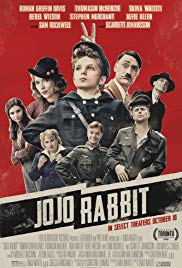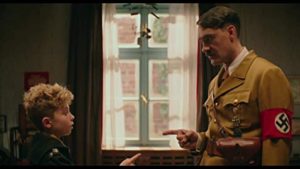Jojo Rabbit *** (2019, Roman Griffin Davis, Thomasin McKenzie, Scarlett Johansson, Sam Rockwell) – Movie Review

Director Taika Waititi’s Jojo Rabbit (2019) is a bold but awkward, uneasy World War Two Germany surreal satirical comedy, with its major plus points in the performances of Roman Griffin Davis as troubled, lonely 10-year-old Nazi boy Joseph ‘Jojo’ Rabbit and Sam Rockwell as the sympathetic German Captain Klenzendorf. Jojo Rabbit has been brainwashed as a member of the Hitler Youth, though he doesn’t quite fit in, crucially refusing to shoot a rabbit when ordered, hence his nickname. His only real friend is a fat boy, Yorki, played sympathetically by Archie Yates.
Jojo Rabbit is ambitious enough, and commendably takes risks, but unfortunately, it is not nearly as funny or sad as it would like to be. There is simply a lack of real hilarity and real terror in the movie. It is merely mildly amusing and vaguely concerning. It is a bit vanilla.
Taika Waititi’s performance as Jojo’s imaginary friend Adolf Hitler is very uneasy, Scarlett Johansson adds star power but no weight to her role as the boy’s sweet single mother, while Rebel Wilson, Alfie Allen and Stephen Merchant are all way too broad as various comedy Nazis. Thomasin McKenzie plays Elsa, the older Jewish girl Jojo meets unexpectedly in his attic Anne Frank-style, and disrespects, but eventually befriends. She is a soothing presence, and calmly appealing, but it is all on one note.
Why are we back banging on about World War Two again, when we have so many pressing contemporary problems? Jojo Rabbit gives no urgent answer to this question. It brings to mind Charles Chaplin’s The Great Dictator (1940) and Ernst Lubitsch’s To Be or Not To Be (1942), but both of them were incredibly relevant (and brave and controversial) because they were made at the time of World War Two and its devastating atrocities. Of course you can say its anti-hate, pro-Jewish message is always relevant and timely, and a good thing, and that is the main value of Jojo Rabbit. Adolf Hitler’s portrayal as a funny idiot instead of a desperately dangerous mass murderer is still a controversial idea.
It also brings to mind the 1997 Life Is Beautiful. Like Life Is Beautiful, Jojo Rabbit does not work on a realist level, only its own fantasy level, and when we are talking about Nazis, that is very awkward indeed. Unlike Life Is Beautiful, Jojo Rabbit hardly comes to terms with the depths of the Nazi depravity. The ‘heil Hitler’ sequence is silly broad farce, very reminiscent of Mel Brooks (who remade To Be or Not To Be) so it no wonder that Mel Brooks has praised Jojo Rabbit so highly. But Schindler’s List is probably the best route to go if we’re talking Nazis, or The Pianist.
Still the film is warm and well meaning, often likeable and sometimes amusing, and certainly extremely well made, with Nazi Germany painstakingly conjured up in scenes that are convincingly realistic, in bewildering contrast, say, to Stephen Merchant’s comic ‘German’ accent as the idiot Nazi Deertz or Rebel Wilson’s ‘wacky’ turn as Fraulein Rahm. Is this a ‘truthful’ comedy or not?
Waititi’s screenplay is based on Christine Leunens’s novel Caging Skies. Waititi describes his film as a ‘love letter to mothers, especially single mothers’. His own Jewish mother brought the novel to his attention.
How odd and disturbing that Waititi directed some scenes in his full Adolf Hitler costume and make-up.
It was nominated for two Golden Globes: Best Motion Picture – Musical or Comedy and Best Performance by an Actor in a Motion Picture – Musical or Comedy (Roman Griffin Davis) but no wins.
© Derek Winnert 2019 Movie Review
Check out more reviews on http://derekwinnert.com


